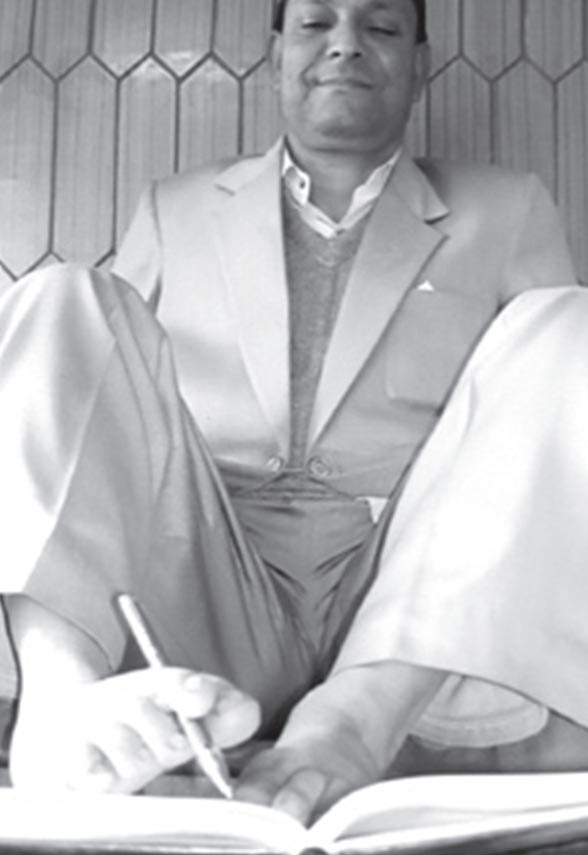 Armless connotes powerlessness; Ghulam Hassan Ganai, 56, lost both his arms in his childhood. He didn’t lose his power. He didn’t lose his determination. It has only increased since.
Armless connotes powerlessness; Ghulam Hassan Ganai, 56, lost both his arms in his childhood. He didn’t lose his power. He didn’t lose his determination. It has only increased since.
A resident of Hutmarah hamlet near Mattan town in Islamabad district, Hassan led a healthy life until December 12, 1965. Then a student of 7th class, he lost both his arms when he came into contact with live transmission wires hanging from a transformer in the village.
“We were playing volleyball and a player hit the ball harder. It landed near the power transformer. I rushed to fetch it but got entrapped in live transmission wires,” recalls Hassan. “Repeated electric shocks paralysed me. When I regained consciousness in the hospital, both my arms were amputated from shoulders.”
Two months after the tragedy, a valiant Hassan sat in his 7th grade examination with another boy writing answers on his dictation. Determined to defeat the helplessness wrought by the sudden handicap, he started working for self reliance.
“After the examination, I felt a strong urge to do things my way. I used to hold small twigs between the toes of my right foot and inscribe on as vast a slate as earth. One day I told my father to buy a pencil and notebook for me and started writing with toes which proved my first step towards self empowerment,” says Hassan. No sign of handicap fatigue reflects from his broad forehead. “The first essay I wrote with my toes was about a thirsty crow.”
Hassan never failed in his studies. He completed his Bachelors in Arts and Bachelors in Education, writing answers with his toes. He was appointed a teacher in 1973. Earlier in 1969, J&K Cultural Academy enacted a play ‘Kashmakash’ on his life.
“The play was written by late Ali Mohammad Lone and was performed at Kupwara where I demonstrated my skills. It enthused a lot of people who were normal but not using their capabilities and abilities to the fullest,” Hassan says.
Continuing to empower himself, Hassan trained his feet to compensate loss of hands. While teaching his students at the school, he would lower the black board and sit on the chair bringing his feet at par with blackboard to write lessons on it with his accustomed toes.
“It is now no problem for me to even shave my beard. I perform almost all my chores without anyone’s help.” A God-fearing person, Hassan offers prayers five times a day without fail. “I manage all things in the bathroom myself. Alhamdulillah, Allah has taken one blessing from me and compensated it with another,” he says, seemingly contented.
For his extraordinary efforts to face the challenges of life after losing both arms, Neelam Sanjeeva Reddy, the then president of India, gave Ghulam Hassan Ganai National Award for Achievement of Life in 1982.
“When I received the award, a female Ph. D. scholar of Patna University read about it in newspapers, contacted me and offered to marry me. I declined, probably because I had little experience of life,” Hassan says. There are some occasions when Hassan’s resolve melts away. “When I board a bus and the driver suddenly drives off, I trip over. Similarly when I stand in the aisle of a bus, I vacillate because I can’t hold onto anything,” Hassan says with a hoarse tone.
Ironically, Hassan is posted 50 kilometers away from his home, as Headmaster of Government High School Watoo in Kulgam.
“I request my bosses to post me at some nearby school so that in the last two years of my career I do not face hardships. They can easily stop hardships coming in my way,” Hassan says. Although he says his happiness comes from helping others to be happy, he is hurt when people taunt him. Once an officer told him that he was taking “undue advantage” of his disability.
“All I was requesting them was to pay a visit to my school (Middle School Hutmurah) that I had turned into a model school. ‘Allah’s curse befalls the wicked’ the deputy commissioner told me,” he says.
Ganai was hurt and since then he says he is overcautious. “I never insist for anything that may invite an insulting response. A disability is a permanent disease and people must respect and help physically challenged persons.”















